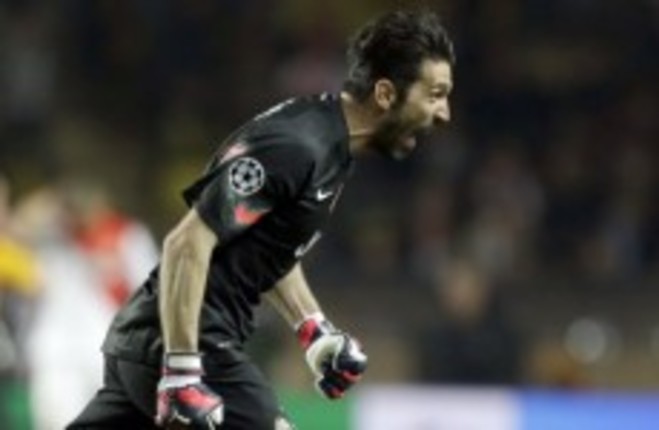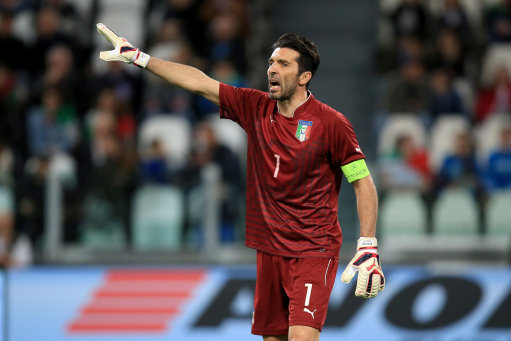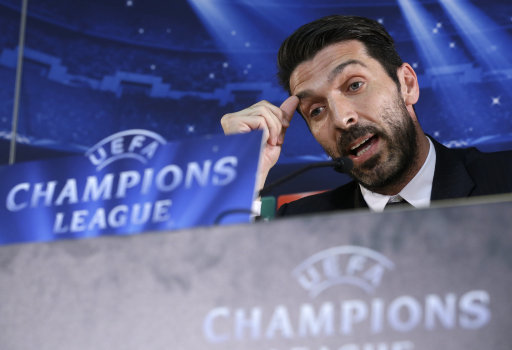“I BET YOU that in the next 10 years, Italy will return to be the leader of Europe, the locomotive of Europe” – Matteo Renzi, Italian Prime Minister, 2014.
“When the fuck will I get another chance like this?”
Gianluigi Buffon stood outside the dressing room at Old Trafford, smoking, contemplating the 2003 Champions League final that had just slipped away from his Juventus team. He couldn’t have known how far off course Juve would lurch, nor that the world’s greatest goalkeeper would have to wait so long for that next chance.
Though Buffon remains, that all-Italian, penalty shoot-out final against Milan seems from another era now. The slow slide of Italian football from the peak of European achievement would gather pace in the ensuing seasons, Milan’s productive old-timers club and Mourinho’s Inter notwithstanding.
Buffon had announced himself against Milan eight years previously, as a 17-year-old at Parma. On his international debut, aged 19, he made one of his most iconic saves. He’d come on for the injured Gianluca Pagliuca in a Moscow snowstorm half an hour into Italy’s 1998 World Cup play-off against Russia. Minutes later, Andrei Kanchelskis skipped through the tundra of the inside-right channel and crossed for the arriving Dimitri Alenichev; his low, first-time shot was turned round the post by Buffon in a style that would soon become familiar: preternatural anticipation, a long-limbed reach and a dismissive clout.
As Buffon savoured his feat in the time-honoured goalkeeper’s fashion – bollocking his negligent defenders – Fabio Cannavaro delivered an affectionate head butt onto his club team-mate’s chest in gratitude. It must have seemed the right thing to do at the time.
The scene is evocative for a number of reasons: a reminder of Buffon’s early majesty and Cannavaro’s pumped up enthusiasm for goal-prevention, as well as of the glorious company they once kept – Nesta, Costacurta and Maldini were their back five accomplices; a foreshadowing of another, more notorious head-to-chest encounter in Berlin nine years later; and a melancholy sense of the travails that Buffon and his country’s football would endure in the time since.
In the early years of the century, Buffon became emblematic of goalkeeping itself. Any conversation about the art at that time took Buffon as the gold standard. To the obligatory requirements – presence, agility, reflexes – he brought the rangy athleticism of volleyball, a sport at which two of his sisters were internationals. And when Buffon saved a shot, it stayed saved. Eschewing fingertips, he shovelled the ball away, full-handed, as if admonishing it for its impertinence. Claiming a ball from a cross, he’d emerge from the six-yard box with a baleful stare, like a gravedigger disturbed while about his work.
He exuded the essence of the job: forbidding, defiant, intimidating.
But he’s not really a buzzkill kind of guy. His personality is good-naturedly laddish, a typical Italian ragazzo. In ‘The Outsider’, his history of goalkeeping, Jonathan Wilson recounts a story from Buffon’s Parma days, in which he plucked one of the club’s head hooligans, bloodied and battered, from an inter-ultra dust-up in Florence, bundled him into his Porsche, negotiated a police checkpoint and sped back to safe ground, concluding the escapade in the nightclubs of Parma.
Even last year, at the age of 36, the captain of club and country conducted an interview with FourFourTwo with larkish good humour, and, unwittingly, flies undone. Asked about his decision to stay at Juventus when they were relegated over the Calciopoli scandal in 2006, he said “Of course it was easy. They threw a load of money at me! No, no, I’m just kidding, of course!”
Unbeatable on the pitch, likable off it. But in 2003, after Old Trafford, Buffon slipped into depression. He played through it, citing the responsibility of his position – “I had a European Championship to play in”. Self-doubt made him fearful of going onto the pitch, his legs shaking uncontrollably. It lasted about six months. “It was simple really, I wasn’t satisfied with my life and my job,” he wrote in his autobiography.
Wilson suggests that despite his material riches “a lack of human values” was behind his existential funk. Explaining the real reason for his decision to stay at Juventus after Calciopoli, a freshly-minted World Cup medal in his pocket, Buffon pointed towards character rather than career advancement. “The choices you make in life can be tough, they might not make your life any easier, but they make you the person that you are,” he told FourFourTwo.
Buffon did the noble thing, but it has been a tough road back. He endured Serie B, back injuries and two seasons of Claudio Ranieri. He is no longer the greatest, merely one of the best. A slight loss of agility makes getting down to make saves like the one in Moscow harder, while annual rumours of his leaving Juventus for a better place fizzled out.
And then came Antonio Conte, a new stadium and four Serie A titles.
In many ways Buffon’s story is an allegory for Italian football, which in turn reflects Italian society. “As long as I am here, I am going to try to change Italy,” prime minister Matteo Renzi tweeted last week on winning a confidence vote on his radical political reforms. For Renzi’s toil against the country’s bloated administration, soaring indebtedness and systemic corruption, read the efforts of Italian football clubs to modernise stadia, deal with hooliganism and revitalise income streams. Italy’s economic and social problems are football’s too and perhaps fixing them will fix football also.
But Buffon is a reminder of other things in Italian football. Not just the bittersweet nostalgia of a glorious past; but of passion and loyalty, craziness and fun. A deep, rich culture with the strength to withstand its current trials.
Back in that Old Trafford corridor, Juventus executive and ex-player Roberto Bettega had overheard Buffon’s mournful remark about missed chances. “At Juventus, they tend to come along rather a lot,” he consoled.
Maybe their chance has come again.



